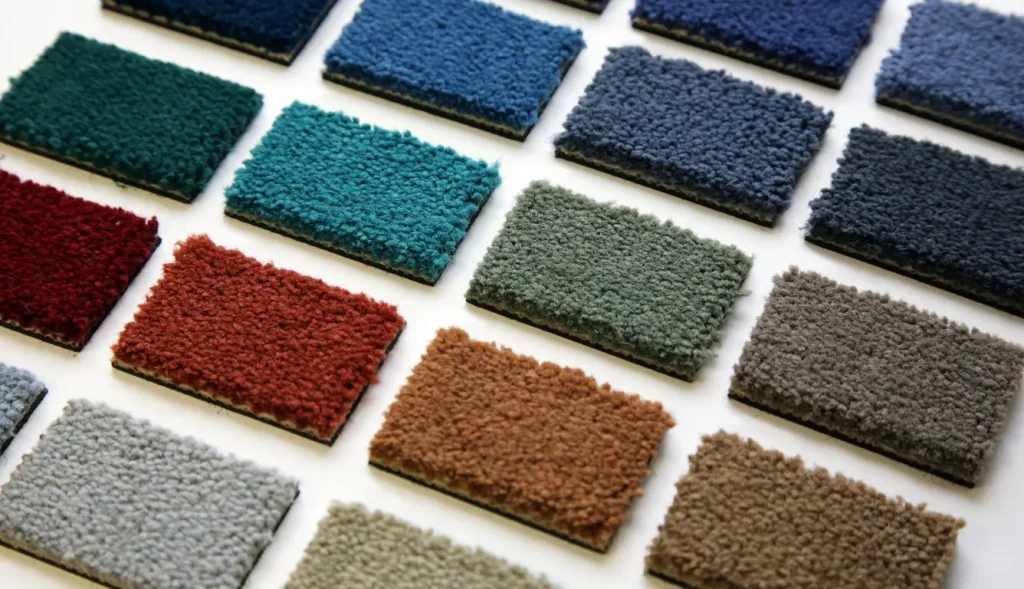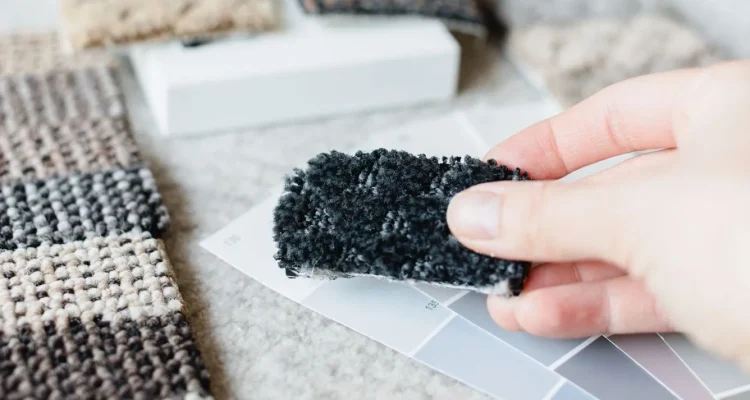Introduction
Choosing the right carpet color is more than just a decorative decision; it can influence the ambiance and functionality of a room. Whether you’re going for a cozy and inviting feel or a sleek and modern look, the color of your carpet plays a pivotal role. In this guide, we’ll explore the various factors you need to consider when selecting a carpet color to ensure it complements your home perfectly.

Understanding Your Space
Evaluating Room Size and Light
Before picking a carpet color, it’s essential to evaluate the size and lighting of your room. Lighter colors can make a room feel larger and more open, while darker colors can create a more intimate and cozy atmosphere. If your room has limited natural light, consider lighter shades to brighten up the space.
Matching Carpet Color with Room Function
Different rooms serve different purposes, and your carpet color should align with the function of each space. For example, vibrant colors may be ideal for a playroom, while serene hues are better suited for a bedroom.
Color Psychology in Carpets
Warm Colors: Energy and Warmth
Warm colors like reds, oranges, and yellows can make a room feel energetic and inviting. They are great for areas where you want to foster social interaction and warmth.
Cool Colors: Calm and Serenity
Cool colors such as blues, greens, and purples evoke a sense of calm and relaxation. These colors are perfect for bedrooms or spaces where you want to unwind.
Neutral Colors: Versatility and Balance
Neutrals like beige, gray, and taupe offer versatility and can easily match various décor styles. They also have the advantage of being less likely to show dirt and wear.
Current Trends in Carpet Colors
Popular Colors in 2024
In 2024, carpet colors are trending towards soft, natural tones and bold, dramatic hues. Colors such as muted greens, soft blues, and rich charcoals are making a splash.
How to Incorporate Trends without Overcommitting
Trends can offer inspiration, but it’s important to choose a carpet color that you’ll be happy with long-term. Consider integrating trendy colors through accessories or accents rather than making them the central focus.
Choosing Carpet Color Based on Room Type
Living Rooms: Creating Comfort and Style
For living rooms, opt for colors that reflect your personal style and the room’s atmosphere. Softer hues can create a relaxing environment, while bolder shades can make a statement.
Bedrooms: Cozy and Relaxing Environments
Bedrooms benefit from calming, soothing colors. Choose shades that promote relaxation and match your bedding and furnishings.
Offices: Professional and Focused Spaces
In a home office, select colors that enhance focus and productivity. Neutral tones or subtle colors work well to maintain a professional ambiance.
High-Traffic Areas: Durability and Maintenance
In high-traffic areas like hallways and entryways, choose durable colors that can withstand wear and are easy to clean.
Combining Carpet Colors with Existing Décor
Coordinating with Wall Colors and Furniture
When choosing a carpet color, consider how it will interact with your wall colors and furniture. Aim for harmony between your carpet and existing décor to create a cohesive look.
Using Carpet Color to Complement or Contrast Décor
You can use carpet color to either complement or contrast with your décor. Complementary colors create a unified look, while contrasting colors can add visual interest.
Practical Considerations
Stains and Maintenance: Choosing Practical Colors
Consider how your carpet color will handle spills and stains. Darker colors tend to hide stains better, while lighter colors may require more maintenance.
How Lighting Affects Carpet Color Perception
Lighting can dramatically alter how a carpet color looks. Test carpet samples under different lighting conditions to see how they will appear in your space.
Testing Carpet Samples
Importance of Sampling
Always test carpet samples in your home before making a final decision. This helps you see how the color works with your lighting and existing décor.
How to Test Carpet Samples Effectively
Place samples in different areas of the room and observe them at various times of the day to understand how they will look in different lighting conditions.
DIY vs. Professional Help
When to Consider Professional Consultation
If you’re unsure about choosing the right color or coordinating with existing décor, consider consulting a professional. They can provide valuable insights and recommendations.
DIY Tips for Choosing Carpet Color
For those who prefer a hands-on approach, use online tools and apps to visualize how different carpet colors will look in your space. Sampling and observing colors in natural light are crucial steps.
FAQs
What are the best carpet colors for small rooms?
Lighter colors such as beige, soft gray, and light blue can make small rooms appear larger and more open.
How can I make my carpet color choice last longer?
Opt for neutral tones or colors that match your existing décor to ensure your carpet remains stylish over time. Regular cleaning and maintenance will also help prolong its life.
What is the impact of carpet color on home value?
Neutral and classic carpet colors tend to appeal to a broader range of buyers, potentially increasing your home’s marketability and value.
Can carpet color affect room temperature?
Lighter colors reflect more light, which can make a room feel cooler, while darker colors absorb heat, potentially making a room feel warmer.
How do I match carpet color with different flooring types?
Ensure that your carpet color complements or contrasts with other flooring types in a harmonious way. Neutral colors often work well with a variety of flooring materials.
Conclusion
Choosing the right carpet color involves a blend of personal preference, practical considerations, and an understanding of how color affects your space. By evaluating your room’s size and function, considering color psychology, and testing samples, you can select a carpet color that enhances your home’s ambiance and suits your lifestyle.


Congratulation!